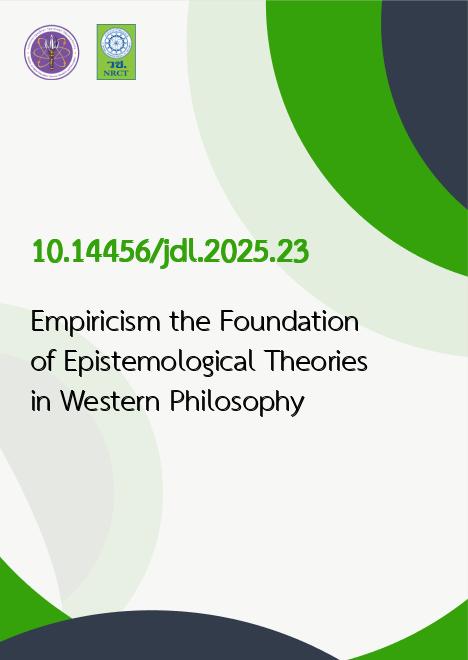
|
Empiricism the Foundation of Epistemological Theories in Western Philosophy |
|---|---|
| รหัสดีโอไอ | |
| Creator | Phra Narong Suphatto (Saysook) |
| Title | Empiricism the Foundation of Epistemological Theories in Western Philosophy |
| Publisher | Buddhist Studies Foundation Wat Buranasiri Matayaram |
| Publication Year | 2568 |
| Journal Title | Journal of Dhamma for Life |
| Journal Vol. | 31 |
| Journal No. | 2 |
| Page no. | 318-333 |
| Keyword | Empiricism, Epistemology, Theory of Knowledge |
| URL Website | https://so08.tci-thaijo.org/index.php/dhammalife |
| Website title | https://so08.tci-thaijo.org/index.php/dhammalife/article/view/4804 |
| ISSN | 2822-048X |
| Abstract | This academic article aims to examine the theory of knowledge in empiricism. The study reveals that empiricism is a fundamental concept in Western philosophy, emphasizing that knowledge originates from sensory experience and observation. Prominent philosophers in this tradition include John Locke, who proposed the concept of Tabula Rasa, viewing the human mind as a blank slate that acquires knowledge through experience, and David Hume, who argued that knowledge arises from impressions and ideas formed through repeated perception.This article analyzes the philosophical contributions of Locke and Hume, highlighting empiricism's crucial role in shaping scientific methodology—particularly through observation, experimentation, and empirical validation. However, the study also acknowledges empiricism’s limitations in addressing abstract forms of knowledge, such as mathematics and logic.The historical development of empiricism is also explored, from Locke’s emphasis on external experience in knowledge formation to Hume’s skepticism regarding the certainty of knowledge and the concept of causality. The study concludes that the ideas of Locke and Hume laid the foundation for modern epistemology and significantly influenced various disciplines, including psychology, education, and science. By emphasizing experience as the basis for acquiring knowledge, empiricism has been widely applied across fields. Despite its limitations, it underscores the enduring value of empirical data in the process of knowledge creation. The analysis of Locke and Hume’s theories reflects the evolution of Western philosophy and paves the way for future theoretical advancements, contributing meaningfully to education and research. |